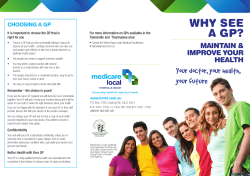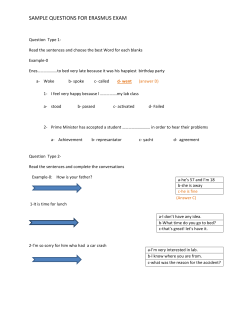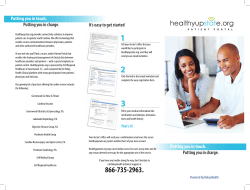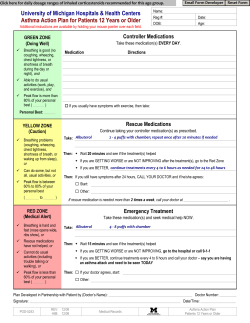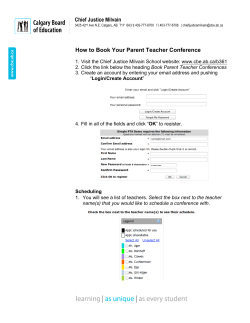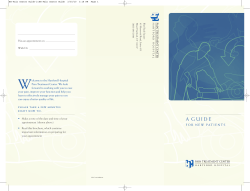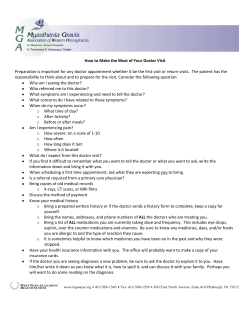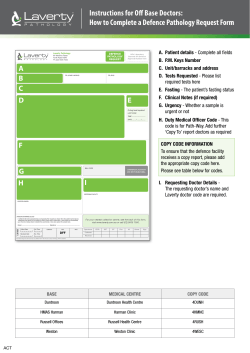
10 Tips on How to Make the Most of Your...
10 Tips on How to Make the Most of Your Doctor’s Appointments By Parent and Family Health Management Expert Jodie Pappas Keeping good medical records for your family is one simple and possibly live-saving thing you can do to avoid medical mix-ups such as allergic reactions to misdiagnosed medications. Jodie Pappas, Parent and Family Health Management Expert created a journal to accommodate her own family’s needs when one of her children was born with a rare condition requiring regular doctor visits and surgeries. Says Pappas, by keeping your own up-to-date records of your family health history, illnesses, medications, immunizations, etc. other members of the family or caregivers can refer to it when there is a need to know on the spot information to assist in diagnosis. 10 Simple things you should do each time you visit the doctor: 1. Know your family medical history. Ask your parents and your inlaws about their medical history and keep good records. Look at your past notes about medications, allergies, growth & development…to refresh your memory. 2. Do your homework first. Know what immunizations your children might be due for. Read about children’s health issues or something of concern through a reliable website or book. Talk to friends – you’ll be amazed how many people have “a friend’s neighbour’s sister” who had a similar medical condition that you can learn from. Know what options you have. 3. Write down your questions in advance of your appointment. Start thinking about an upcoming appointment about 1-2 weeks prior to the date. As you go about your day, think of a question you want to know and simply write it down. As more questions come write them down. This way you have prepared and can have a more successful partnership with your doctor. There is nothing worse than getting home after an appointment and then remembering that important question you meant to ask, but forgot! 4. Listen to your children. Watch for changes in behaviour or complaints of pain, strange feelings or any other unusual changes. 5. Take good notes during and afterwards. Use your Family Medical Journal during the appointment to write down what the doctor says. When you get home, do a mental checklist of what you spoke about and make sure you wrote it all down. As weeks and months pass, your memory of what was said fades and keeping notes will jog your memory. 6. Know where your health and immunization cards are! Keep them together with your medical records at all times. You don’t want to show up without them or worse – be frantically searching for them in an emergency. 7. Plan to have a long wait. You never know how long it will be before your doctor sees you, especially if they get called out for an unexpected emergency. If you have small kids, bring lots of nut-free snacks, beverages, books and toys. It’s better to play with your own toys and not with the ones in your doctor’s office that could have little Sammy’s runny nose drippings all over them! 8. Medications 101 – ask about possible side effects and watch for them. If there is a 1% chance of Sarah getting a weird rash – you can bet Sarah will get that weird rash. Phone your doctor and/or the pharmacist in the event of a strange reaction and read that handy insert that many pharmacies now give you about the medication you are taking. Keep it with your medical records for future reference and write down what the doctor prescribed. 9. Keep your important phone numbers handy. 10. Make sure your spouse/partner knows what’s going on. Share your detailed notes and medical information with your partner, especially if it’s possible that they will have to take a family member to an appointment. This way, if they do have to take the kids in a pinch, they have all the information they need at their fingertips. Parent and Family Health Management Expert Jodie Pappas created The GET ORGANIZED! Family Medical Journal after one of her newborn twin girls was born with a rare medical condition that required ongoing treatment and surgery. While attending numerous doctors’ appointments at the Hospital for Sick Children in Toronto, Ontario with a variety of specialists, all who kept different records, Jodie decided that she needed a way to keep track of medical information for her family. The journal has separate sections for each family member with charts to log all pertinent information for each: an at a glance medical treatment history, medical appointment records, immunizations, growth charts and more. For more about Jodie Pappas and the Get Organized! Family Medical Journal visit: www.getorganizedjournals.com
© Copyright 2025

